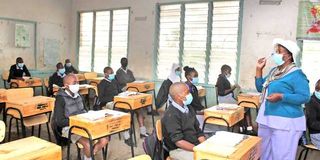Schools must address mental health needs of pupils abused during break

The deputy headteacher of Moi Avenue Primary School, Nairobi, speaks to Standard Eight candidates when schools reopened on October 12, 2020 after months of closure due to Covid-19.
What you need to know:
- Directly hit hard are the girls who fell victim to sexual violence and other violations and circumstances that led to their getting pregnant.
- Tens of these minors and teenage mothers will find themselves back in school but under different situations.
Bar a drastic and far-reaching occurence, schools will fully reopen on January 4 in accordance with a directive from the Ministry of Education.
This has been a year like no other — a terrible and one that we would all want to wish away, given the toll of the dreadful Covid-19 since March. These unfortunate effects will not only be felt by the schools but also directly by pupils and students.
However, directly hit hard, especially emotionally and psychologically, are the girls who fell victim to sexual violence and other violations and circumstances that led to their getting pregnant.
Tens of these minors and teenage mothers will find themselves back in school but under different situations.
When Covid-19 struck, there followed a startling and disturbing escalation of various forms of violence against women and girls — particularly domestic violence — partly attributed to economic difficulties at the family level due to lockdown and containment measures imposed in a bid to curb the virus.
With school closures, perpetrators of this violence, which includes child labour, did not spare girls and boys, many of whom were locked up at home with their abusers.
The result has been escalation of teenage pregnancies, some leading to forced “marriages’’ of the minors by their families. Statistics of these incidents are out there in the counties, even as some administrators deny it.
It is the reality that we must face and deal with. It is obviously foolhardy for anyone in leadership and directly responsible for making efforts to prevent and deal with such situations to attempt to hide the truth when it is out there for all to see.
Although some of the harsh lockdown measures were lifted and the economy partially reopened, the risk of sexual and gender-based violence for girls, especially sexual exploitation, is still high as long as this peculiar coronavirus situation lasts.
Matter are complicated by a convoluted, complex and long-winded justice system in the prosecution of perpetrators and their accomplices.
Strange situation or status
There is a critical and urgent need to help these minors who find themselves in a strange situation or status — some as mothers, others pregnant while huge numbers of both girls and boys will go back to school with mental health issues resulting from the effects of the containment measures.
There are also those who have been subjected to the illegal female genital mutilation or cut (FGM/C), others scarred by forced labour and now carrying the emotional burden of having witnessed all forms of sexual and gender-based violence, especially physical, within the families.
Parents and guardians may not fully comprehend how much damage these acts of violence affect the children mentally, particularly during these unique circumstances.
So, as schools reopen, this is the combination of pupils and students that teachers and schools administrators will be confronted with.
Bear in mind the July directive by President Uhuru Kenyatta that teenage mothers be unconditionally allowed back to school.
The situation in informal settlements is more dire. Here, there will be child mothers operating from their ‘husbands’ homes as their ‘wives’. There will also be survivors of defilement, including incest, who still live with their abusers, mainly family members.
In addition, there are those who will be returning to the classroom from broken homes and going back to the same violent situations after school, and survivors of sexual and labour exploitation, forms of abuse that are commonly perpetrated against children.
It is important that teachers start off by understanding their pupils and students and get to learn how they have fared at home during the year-long Covid-19-instigated break.
It is clear that there will be a need for psychosocial support, compassion, understanding and guidance for children likely to be dealing with mental health issues emanating from the negative effects of the dreaded global pandemic.
Ms Rugene is a consulting editor and founder, The Woman’s Newsroom Foundation. [email protected]. @nrugene





